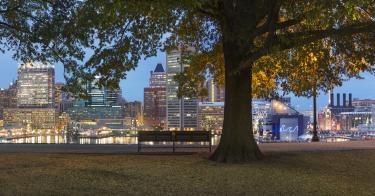The recent uproar over the crime and despair in Baltimore has shined a national spotlight on the fact that people have been waiting years for government solutions to fix the problems plaguing America’s inner cities — solutions that seldom, if ever, come.
Years ago, as a black woman who had come out of the projects, I realized that the cavalry wasn’t coming. The government wasn’t riding in with the solutions to save the day and revitalize our once-thriving inner cities. Frankly, it was government that had wrought much of the destruction.
Eventually, I started looking to history for the answers. I wanted to know how the newly freed slaves in Post-Reconstruction America survived — even thrived. How did our ancestors build businesses, create outstanding educational institutions, and develop a significant “middle class” with a government that not only didn’t provide programs for the black community, but was often antagonistic?
I learned that they had created a vibrant civil society that consisted of strong families, a powerful faith life, distinguished educational institutions and tightly woven communities where people looked out for one another.
These same institutions are the very building blocks we must begin rebuilding today to turn our inner cities around.
First, we need to strengthen families by ensuring that no government program or policy is weakening them. I’ve seen children who grew up without both parents at home begin to have trouble in school and get in trouble with the law. I’ve seen fatherless teens look to drugs and street gangs to fill the void. I’ve seen dependence take the place of work. I’ve seen children grow up and continue this cycle to the next generation.
Second, we must stop the attacks on religious liberty, stop pushing churches out of desperately needed human services work, and stop marginalizing the positive role faith plays in our communities. Faith gives people hope and teaches them love. It teaches them that there are things bigger than themselves and there are consequences for the good and bad that we do. Churches also provide a sense of community, a place to learn strong values, and a safety net for those in physical, spiritual and emotional need.
Third, we must ensure a pathway out of poverty for inner-city children by fixing our broken educational system. Failing urban schools deprive our children of discovering the potential of their own minds, of proper socialization, and of future career prospects.
Fourth, we must re-establish a sense of community in our broken cities. Recently, we saw a small but poignant example of this in Baltimore — of people coming together to try to fix things on their own when they knew the cavalry wasn’t coming any time soon.
Conservative activist Scott Presler was fed up with the despair he saw in Baltimore. So he used social media to organize a cleanup day, tweeting, “I’m going to go to Baltimore, even if it’s just me standing on a street corner alone picking up trash.”
Of course, a trash cleanup day doesn’t solve all of the inner city’s problems, but it plants seeds of change. Within six days of Mr. Presler calling on people to join him, he had organized over 170 volunteers nationwide and from within Baltimore itself. Together, they picked up 12 tons of trash in 12 hours.
Twelve tons.
The success of the cleanup attracted even more people who wanted to help, so there’s another cleanup scheduled for September. Other cleanups have begun in Newark, New Jersey; Los Angeles; and elsewhere.
Efforts like Mr. Presler’s are what places like Baltimore need. They show the power of individuals in civil society coming together rather than waiting for government to step in. Just as important, the results of these cleanups aren’t just cosmetic. They can have a lasting effect on improving neighborhood safety and pride.
It’s based on the “broken windows” theory: Signs of inner-city decay like vandalism, trash and smaller crimes going unpunished imply that government will tolerate a certain level of civil disorder. That disorder then attracts more of the same and even more serious crimes as the envelope keeps getting pushed. Taking care of the “broken windows” can bring much-needed order, and residents regain respect for their own communities.
For years, our inner cities have been laboratories where the far left has experimented with big-government policies that have ended in failure, harming the very people they said they wanted to help. To turn situations like Baltimore around, we not only need better policies from government, we must reinforce and respect once again the very building blocks of society — family, faith, education and community. These are the places where change must begin for any change to be truly successful.
This piece originally appeared in The Washington Times




